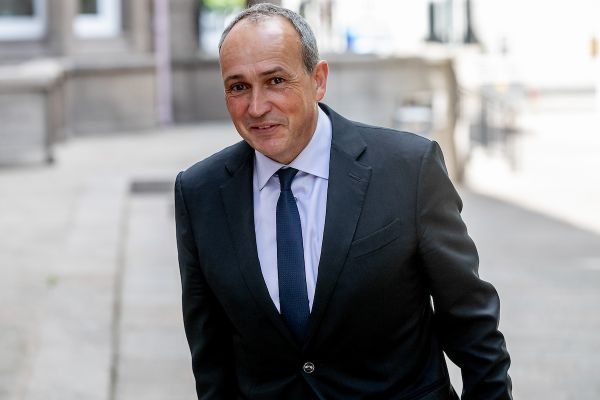


This week, Ministers published plans to increase the the minimum tax paid by new high-net-worth residents... But what could that mean for the scheme?
Under new proposals put forward by Treasury Minister Deputy Ian Gorst, the minimum tax requirement for new 2(1)(e) residents would rise by £80,000 to £250,000 – a 47% increase.
If States Members agree, Deputy Gorst's plans would also see the minimum property purchase price has also risen to £3.5 million for houses, and £1.75 million for apartments and residents would have to have a minimum of £10 million in assets, excluding the value of their home.
According to a report about the proposals – which will not affect existing high-value residents – the changes are estimated to generate an extra £1.2 million for the public purse each year.
The proposals have generated mixed views among supporters of the scheme, with some going so far as to suggest that it may lead to fewer people to apply to move to Jersey, as Express found out...
Garry Bell, a Partner and Head of Tax at PKF bba Chartered Accountants, has experience in helping high-net-worth individuals relocate to Jersey.
He had a two main concerns with the proposed changes. Firstly, he worried that the proposed changes would make Jersey seem like an "inconsistent" jurisdiction, noting that the minimum tax threshold already rose from £125,000 to £145,000 in 2018, and then again to £170,000 last year.

Pictured: The minimum tax requirement for new 2(1)(e) residents could rise by £80,000 to £250,000 – a 47% increase.
He said: "We've had now three changes in five years. We've had this review that's been going on for the best part of around seven months. It doesn't make us look consistent as a jurisdiction and that's one of the things people do look for, for sure."
He also noted that Jersey is now considerably more expensive than other low-tax jurisdictions. For instance, the minimum tax requirement is £200,000, while in Guernsey it is £50,000 for the first three years, then £150,000 overall.
While he was keen to point out that this will not necessarily deter people from coming altogether, as other factors such as lifestyle also play an important role, it will have an impact.
"It's what we call buyer perception. For 99% of people, the decision to move is never just based on tax. But you've got to be in the conversation.
"The analogy I would use is that if you had a BMW and an Audi, and the BMW is 20%, more expensive than the Audi, what you're saying is, 'Why would I pay the extra? They're both good German cars.'
"You don't realise the island is actually a Rolls Royce until you get close... but how do we convince you to come in? Or at least look at the island?"

Pictured: "You don't realise the Island is actually a Rolls Royce until you get close."
Losing high-net-worth individuals, he argued, could mean both an economic loss, and a lost opportunity for networking and mentorship.
"For example, you could have a retired individual who has been extremely senior in a global bank – you can imagine what their little black book is like."
Former Senator Alan Maclean, who was previously Economic Development Minister and Treasury Minister, expressed similar concerns.
Pictured: Alan Maclean was previously in charge of the scheme as Economic Development Minister.
Responding to the new proposals on Twitter, he wrote: "A second change to the wealthy immigrants tax regime in just six months is chaotic, creating uncertainty that is extremely damaging to the island's reputation and ability to attract investment.
He added scathingly: "What’s the point? No independent research and we will be 500% more expensive than Guernsey!"
Economic Development Minister in the last Government, Deputy Lyndon Farnham, said he was "broadly supportive" of the proposed changes.

Pictured: Former Economic Development Minister Lyndon Farnham.
The higher minimum contribution, he said, would ensure that "we get and continue to get a really good calibre of people coming to the island".
However, he described the formal requirement for applicants to have £10 million in wealth as "a bit low". He stated that, during his tenure, the figure of £50 million was used, of which £10 million of that should be in cash. This was to ensure that applicants "were prepared to commit to the island".
Meanwhile, Andrew Whelan, Executive Director at high-value loan firm Tenn Capital, said the Government's approach was "fair, sensible and pragmatic".
He was confident that the increased minimum tax requirement would not stop high-net-worth individuals from coming into the island. "It's not a high hurdle, and I don't think it will deter the kinds of people we want coming to the island," he said.
Moreover, he felt that the increase in the minimum property price was "not a bad tactic".
He added: "It's sensible. High value residents are generally buying a property of £3.5 million or upward and the fact is that properties beneath 3m are not the kind of thing that 2(1)(e)'s will be in market for."
The proposed changes will be debated by the States Assembly in July. If passed, the new rules will take effect on the 14 July.
Comments
Comments on this story express the views of the commentator only, not Bailiwick Publishing. We are unable to guarantee the accuracy of any of those comments.